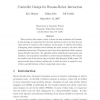Free Online Productivity Tools
i2Speak
i2Symbol
i2OCR
iTex2Img
iWeb2Print
iWeb2Shot
i2Type
iPdf2Split
iPdf2Merge
i2Bopomofo
i2Arabic
i2Style
i2Image
i2PDF
iLatex2Rtf
Sci2ools
108
click to vote
AROBOTS
2008
2008
Controller design for human-robot interaction
Many robotics tasks require a robot to share the same workspace with humans. In such settings, it is important that the robot performs in such a way that does not cause distress to humans in the workspace. In this paper, we address the problem of designing robot controllers which minimize the stress caused by the robot while performing a given task. We present a novel, data-driven algorithm which computes human-friendly trajectories. The algorithm utilizes biofeedback measurements and combines a set of geometric controllers to achieve human friendliness. We evaluate the comfort level of the human using a Galvanic Skin Response (GSR) sensor. We present results from a human tracking task, in which the robot is required to stay within a specified distance without causing high stress values.
Related Content
| Added | 08 Dec 2010 |
| Updated | 08 Dec 2010 |
| Type | Journal |
| Year | 2008 |
| Where | AROBOTS |
| Authors | Eric Meisner, Volkan Isler, Jeff Trinkle |
Comments (0)

